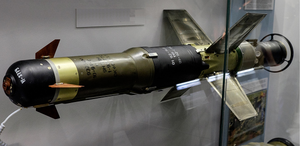SMD-13 Tahadi
| SMD-13 Tahadi تحدي | |
|---|---|
 A deactivated SMD-13A missile. | |
| Type | Anti-tank missile |
| Place of origin | |
| Service history | |
| In service | 1974 - present |
| Used by | |
| Production history | |
| Designer | Rifaee Precision Engineering Bureau |
| Designed | 1964-1972 |
| Unit cost | $23,730 (Export, 2018) |
| Specifications | |
| Diameter | 135 mm |
| Effective firing range | 75 - 4000 m (- 5000 m, SMD-13MJ) |
| Warhead | Single or tandem-charge HEAT |
Detonation mechanism | Impact fuze |
| Engine | Solid fuel rocket |
| Speed | 232 m/s |
Guidance system | SACLOS wire-guidance |
Launch platform | Individual, vehicle |
The SMD-13 Tahadi (Arabic: تحدي, "Challenge") is a Riysian second-generation anti-tank guided missile, developed by the Rifaee Precision Engineering Bureau. Essentially an enlarged and longer-ranged SMD-12 Ain Jalut missile, it is designed for mounting on vehicles and helicopters, but can also be fired from the SMD-12's man-portable firing post.
As of 2019, it is still in production in the improved SMD-13MJ model, and it is both the most produced Riysian anti-tank missile and the most common anti-tank missile in the Riysian Armed Forces. However, its end of life is in sight, as it is planned to replace it with the SMD-19 Amjad complex.
Development
The first generation of anti-tank missiles, Ghandour's SMD-10 Yarmouk and Rifaee's own SMD-11 Hattin, had entered service in Riysa in the late 50s and early 60s, and had been proven to be a valuable set of weapons. However, it was clear early on that the MCLOS guidance system of early ATGMs was a major shortcoming, as it was extremely demanding both physically and psychologically on the missile operator. Thus, in 1964, a request was sent out for a